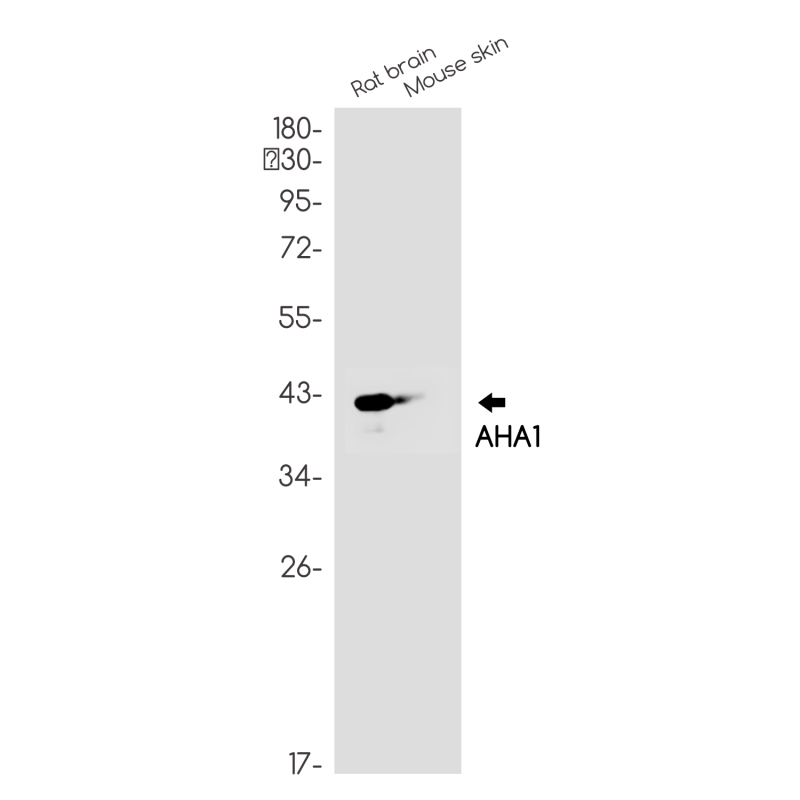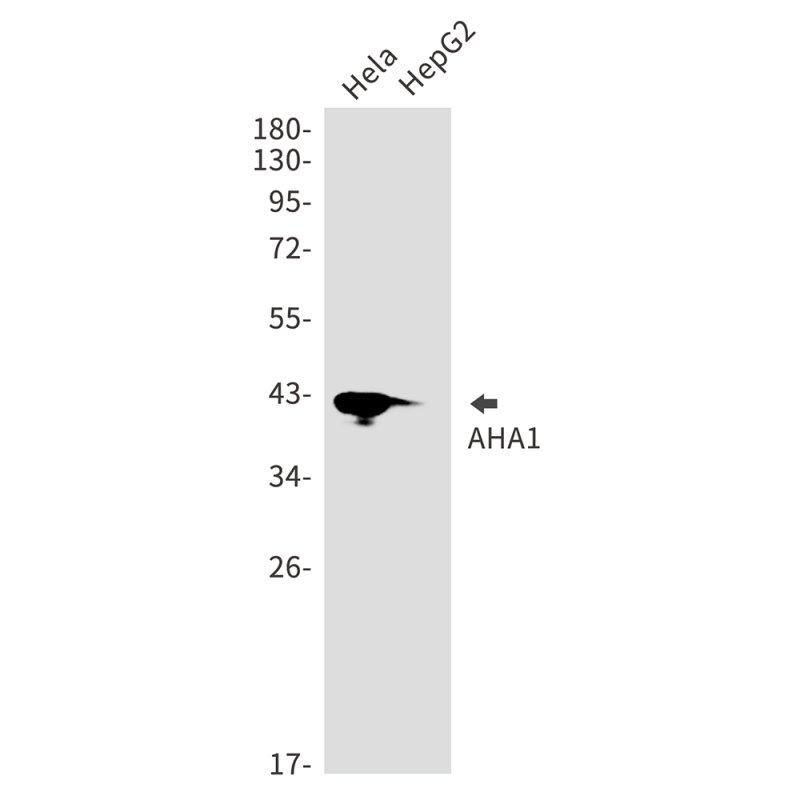

| WB | 咨询技术 | Human,Mouse,Rat |
| IF | 1/20 | Human,Mouse,Rat |
| IHC | 咨询技术 | Human,Mouse,Rat |
| ICC | 技术咨询 | Human,Mouse,Rat |
| FCM | 咨询技术 | Human,Mouse,Rat |
| Elisa | 咨询技术 | Human,Mouse,Rat |
| Aliases | AHSA1; C14orf3; HSPC322; Activator of 90 kDa heat shock protein ATPase homolog 1; AHA1; p38 |
| Entrez GeneID | 10598 |
| WB Predicted band size | Calculated MW: 38 kDa; Observed MW: 42 kDa |
| Host/Isotype | Rabbit IgG |
| Antibody Type | Primary antibody |
| Storage | Store at 4°C short term. Aliquot and store at -20°C long term. Avoid freeze/thaw cycles. |
| Species Reactivity | Human,Mouse,Rat |
| Immunogen | A synthetic peptide of human AHA1 |
| Formulation | Purified antibody in TBS with 0.05% sodium azide,0.05%BSA and 50% glycerol. |
+ +
以下是关于AHA1抗体的3篇参考文献及摘要概括:
1. **文献名称**:*"The Hsp90 chaperone machinery: conformational dynamics and regulation"*
**作者**:Didier Picard
**摘要**:该综述探讨了Hsp90伴侣蛋白的调控机制,重点提到AHA1作为Hsp90的关键辅助伴侣蛋白,通过增强其ATP酶活性调控客户蛋白的稳定性,并提及AHA1抗体在研究其与Hsp90互作中的应用。
2. **文献名称**:*"Aha1 binds to the middle domain of Hsp90 and stimulates ATPase activity through a novel conformational change"*
**作者**:Chrisostomos Prodromou et al.
**摘要**:通过结构生物学和生化分析,揭示了AHA1与Hsp90中间结构域的结合机制,证明其通过诱导Hsp90构象变化激活ATP酶活性,研究中利用AHA1抗体验证蛋白相互作用位点。
3. **文献名称**:*"The role of AHA1 in tauopathy and neurodegeneration"*
**作者**:R. Kayed et al.
**摘要**:研究发现AHA1在阿尔茨海默病模型中过度表达,促进tau蛋白聚集和神经退行性病变,使用AHA1特异性抗体抑制其功能可减轻病理表型,提示其作为治疗靶点的潜力。
The AHA1 (Activator of Heat Shock 90 kDa Protein ATPase Homolog 1) antibody is a tool used to study the AHA1 protein, a co-chaperone that regulates the function of Heat Shock Protein 90 (Hsp90). Hsp90 is a molecular chaperone critical for the folding, stabilization, and activation of client proteins involved in signaling, cell cycle regulation, and stress responses. AHA1 enhances Hsp90's ATPase activity, facilitating conformational changes required for client protein maturation.
Research on AHA1 has highlighted its role in cellular homeostasis and disease. Overexpression of AHA1 is linked to cancer progression, as it supports the stability of oncogenic clients like HER2 and AKT. It also appears in neurodegenerative disorders, such as Alzheimer's disease, where dysregulated Hsp90-AHA1 interactions may contribute to pathological protein aggregation.
The AHA1 antibody enables detection and quantification of AHA1 expression in tissues or cell lines via techniques like Western blotting, immunofluorescence, or immunoprecipitation. It helps explore AHA1's interaction with Hsp90. its tissue-specific expression patterns, and its potential as a therapeutic target. Inhibiting AHA1-Hsp90 activity is being investigated to disrupt cancer cell survival or mitigate protein misfolding in neurodegeneration.
Studies using AHA1 antibodies have provided insights into stress adaptation mechanisms and disease pathways, making it a valuable reagent in molecular biology and translational research.
×